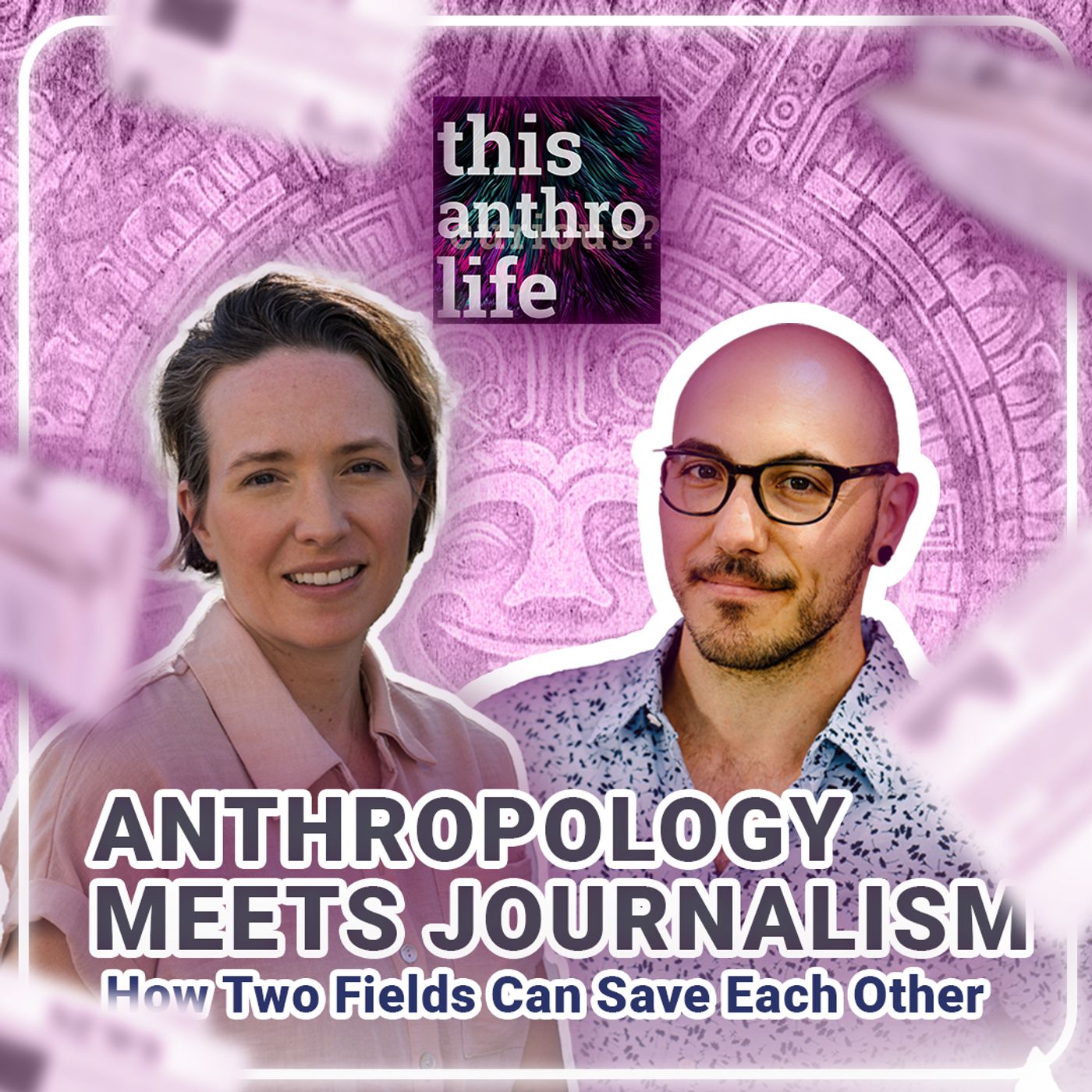
Anthropology Meets Journalism: How Two Fields Can Save Each Other
 2023-08-01
2023-08-01
Download
Right click and do "save link as"
In this episode, Emily Kennedy shares her unique journey of discovering the concept of ethnographic journalism. Journalists now face unprecedented issues like harassment, lack of public trust, and accusations of bias. As a main source of information, journalism's struggles have profound implications. Ethnographic methods and storytelling techniques could transform the communication of the human experience. The episode explores using ethnographic methods in journalism, building interviewee trust, evolving objectivity, and existential fears in both fields. Anthropology and journalism have much to learn from each other.
Emily Kennedy
Emily Kennedy is a trained anthropologist and has worked as a journalist, communications professional, and magazine editor for more than a decade. She has taught as a journalism instructor and guest lecturer at various universities and colleges. Her research and experience in the sphere of anthropology and journalism led to the creation of anthrojourno.org - an online resource for journalists looking to use ethnographic methods in their reporting
Key Takeaways:
Key Topics of this Podcast:
[00:04:10] - Anthropology in journalism and how they related to each other [00:10:05] -The Importance of Writing as an Anthropologist.
[00:12:29] - What counts as the right kind of journalism?
[00:16:43] - Fieldwork and collaboration in journalism.
[00:19:27] - Challenges in journalism and anthropology.
[00:24:02] - Improving the interview process and how to use language effectively.
[00:36:01] - Formula shifts in journalism and representation in storytelling works
[00:41:12] - Overwhelm with too many tabs and how to avoid that
[00:49:03] - Rethinking objectivity and representation.
[00:51:22] - Representation in journalism vs anthropology.
[00:55:00] - Ethnographic journalism and the challenges in journalism today.
[01:01:14] - New ways of using ethnographic methods in journalism.
[01:05:10] - Anthropologists in media and journalism.
[01:14:16] - Insider's perspective in interviews and legal language and journalism.
[01:20:34] - What makes something newsworthy?
[01:28:45] - Editorial decision-making process.
[01:31:28] - Cultural language barriers and the fear of labeling oneself.
[01:39:23] - Identity fear in anthropology.
[01:41:03] - Rise of non-academic anthropologists.
[01:48:14] - Written words as physical landscape.
[01:53:39] - Op-eds and their impact and how AI is a research tool.
Connect with Emily Kennedy:Anthrojourno website: https://anthrojourno.org/ Twitter: https://twitter.com/Kennedy_writes
Connect with This Anthro Life:Instagram: https://www.instagram.com/thisanthrolife/ Facebook: https://www.facebook.com/thisanthrolife LinkedIn:https://www.linkedin.com/in/thisanthrolife This Anthro Life website: https://www.thisanthrolife.org/ Substack blog: https://thisanthrolife.substack.com
This show is part of the Spreaker Prime Network, if you are interested in advertising on this podcast, contact us at https://www.spreaker.com/show/5168968/advertisement
view more
Emily Kennedy
Emily Kennedy is a trained anthropologist and has worked as a journalist, communications professional, and magazine editor for more than a decade. She has taught as a journalism instructor and guest lecturer at various universities and colleges. Her research and experience in the sphere of anthropology and journalism led to the creation of anthrojourno.org - an online resource for journalists looking to use ethnographic methods in their reporting
Key Takeaways:
- Journalism and anthropology share similarities in terms of pulling concepts from other disciplines and the importance of showing their methods.
- Journalists can increase trust by revealing the process behind their work.
- Both journalism and anthropology involve collaboration with various professionals.
- Ethnographic methods are used in journalism, but they are often not explicitly recognized as such.
- Journalism education has seen the rise of other approaches such as engaged journalism and design thinking.
- Improving the interview process is a common challenge in both anthropology and journalism.
- Ethnographic methods can help address challenges in journalism, such as the business model, online harassment, and trust in media outlets.
- Anthropology and ethnography offer a comprehensive perspective that can benefit journalism.
- The balance between collaboration and individuality differs in anthropology and journalism.
- Finding a balance between using formulas and being authentic is important in both journalism and ethnographic writing.
Key Topics of this Podcast:
[00:04:10] - Anthropology in journalism and how they related to each other [00:10:05] -The Importance of Writing as an Anthropologist.
[00:12:29] - What counts as the right kind of journalism?
[00:16:43] - Fieldwork and collaboration in journalism.
[00:19:27] - Challenges in journalism and anthropology.
[00:24:02] - Improving the interview process and how to use language effectively.
[00:36:01] - Formula shifts in journalism and representation in storytelling works
[00:41:12] - Overwhelm with too many tabs and how to avoid that
[00:49:03] - Rethinking objectivity and representation.
[00:51:22] - Representation in journalism vs anthropology.
[00:55:00] - Ethnographic journalism and the challenges in journalism today.
[01:01:14] - New ways of using ethnographic methods in journalism.
[01:05:10] - Anthropologists in media and journalism.
[01:14:16] - Insider's perspective in interviews and legal language and journalism.
[01:20:34] - What makes something newsworthy?
[01:28:45] - Editorial decision-making process.
[01:31:28] - Cultural language barriers and the fear of labeling oneself.
[01:39:23] - Identity fear in anthropology.
[01:41:03] - Rise of non-academic anthropologists.
[01:48:14] - Written words as physical landscape.
[01:53:39] - Op-eds and their impact and how AI is a research tool.
Connect with Emily Kennedy:Anthrojourno website: https://anthrojourno.org/ Twitter: https://twitter.com/Kennedy_writes
Connect with This Anthro Life:Instagram: https://www.instagram.com/thisanthrolife/ Facebook: https://www.facebook.com/thisanthrolife LinkedIn:https://www.linkedin.com/in/thisanthrolife This Anthro Life website: https://www.thisanthrolife.org/ Substack blog: https://thisanthrolife.substack.com
This show is part of the Spreaker Prime Network, if you are interested in advertising on this podcast, contact us at https://www.spreaker.com/show/5168968/advertisement
More Episodes
012345678910111213141516171819
Create your
podcast in
minutes
- Full-featured podcast site
- Unlimited storage and bandwidth
- Comprehensive podcast stats
- Distribute to Apple Podcasts, Spotify, and more
- Make money with your podcast
It is Free
- Privacy Policy
- Cookie Policy
- Terms of Use
- Consent Preferences
- Copyright © 2015-2024 Podbean.com






